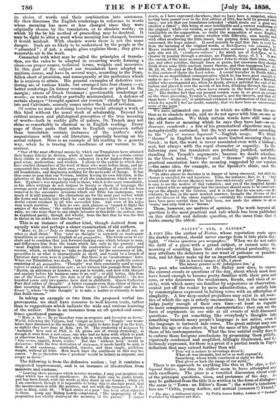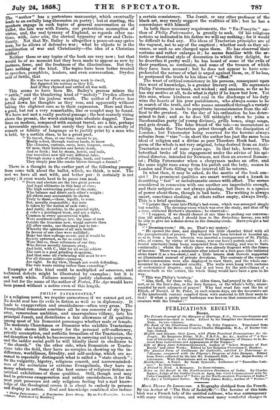BAILEY'S AGE, A SATIRE. * A Pour like the author of
Festus, whose reputation rests upon the darkly mystical, should never emerge from it into plain day- light. " Omne ignotuna pro magnifica ' When we do not catch the drift of a piece with a grand subject, or cannot seize the meaning of sounding lines that obviously intend profundity, we may attribute the deficiency to our want of patience or penetra- tion, and let fancy make up for an imperfect apprehension.
" But in known images of life, I guess
The labour greater as th' indulgence less.'-j The poet who undertakes, as Mr. Bailey now does, to expose the current events or questions of the day, about which most men have heard enough to become pretty familiar with their pros and cons, or who denounces the weaknesses, frauds, and vices of so- ciety, with which many are familiar by experience or observation, cannot put off the reader by mere adumbrations, or satisfy him by commonplaces expressed in halting verse with an affectation of simplicity. A few deep-seated prejudices may exist in all socie- ties of which the age is utterly unconscious ; but in the main men judge justly enough of their own time—at least as regards its more conspicuous persons and characteristics ' - they can see the force of arguments on one side at all events of well discussed questions. To put something like everybody's thoughts into something beneath many people's s language is not satire, even if the language is tortured into verse. The great satirist may ran before his age or rise above it, but the mass of his judgments are those of his contemporaries. What the true satirist really does is to enforce these foregone conclusions by presenting them pithily, vigorously condensed and amplified, tellingly illustrated, and fe- licitously expressed, for there is a great if a partial truth in Pope's definition that may extend further than wit.
"True wit is nature to advantage dress'd; What oft was thought, but ne'er so well exprees'd; Something, whose truth convinced at sight we find, That gives us back the image of our mind."
There is no approach to anything like this in The Age, a Col- loquial Satire, nor does its author seem to have attempted any such excellence. The piece is a versified discussion about some of the principal questions, vices, and pretences of the day. As may be gathered from the title it is written in the form of dialogue the scene is " Town : an Editor's Room " • the writer's interloco- tore are "Critic, young Author, and mutual (common ?) Friend." • The Age; a Colloquial Satire. By Philip James Bailey, Author of "Faeroe:' Published by Chapman and Ball. The " author " has a portentous manuscript, which eventually leads to an awfully long discussion on poetry ; but at starting, the speakers engage in such topics of general conversation as the ballot, the late war with Russia, our pretentious assumption of virtu and, the real tyranny of England, as regards other na- tions, with, inter alia, the clerical hypocrisy of war and Chris- tianity. Not that Mr. Bailey is altogether a peace-at-any-price man, for he allows of defensive war ; what he objects to is the combination of war and Christianity—the idea of a Christian soldier Neither these or any topics of the book are very new; but that would be of no moment had they been made to appear as new by l'ustness force, and the freshness of the illustrations. But they have nothing of the kind. The topics have been better treated in speeches, pamphlets, leaders, and even conversation. Dryden said of Settle, that
He was too warm on picking work to dwell, But faggoted his notions as they fell,
And if they rhymed and rattled all was well. This seems to have been Mr. Bailey's process minus the " rattle," and the blundering kind of " melody ' Dryden allowed to the object of his jealous wrath. The author of Festus has jotted down his thoughts as they rose, and apparently without taking the slightest care as to their expression. Here and there a good, but not a very remarkable, line or couplet may be found. We have not met a really poetical passage ; the best scarcely rising above the prosaic, the worst sinking into absolute doggrel. These lines on modern, compared with ancient travel, are a fair, perhaps a favourable specimen ; but surely they have no such novelty of remark or felicity of language as to justify print by a man who is held, by a certain class, to be a great poet.
To travel, thus, at one time, meant to go, Mostly a-foot, through various lands, to know The climates, customs, races, laws, tongues, creeds, Of men, their histories and heroic deeds, And so forth ; but by steam, hotels, rails, Our travellers now tell very different tales. Through many a mile of cutting, bank, and tunnel, They simply pass like smoke blown through a funnel."
There is a thought in the earlier part of the following passage from some talk about the ballot, which, we think, is new. The rest we have all met with, and better put : it certainly is not poetry; it even wants heat to be prose run mad.
" Peers and electors are the two great powers And legal ultimates in this land of ours ; The high contracting parties of the state, Who balance and direct each other's weight : All others may accountable be shown
Truly to thesel—these, legally, to none.
But, morally responsible ; due note Is taken by the nation of each vote ; And justly, therefore, in the general sight, A. vote's a privileged trust, and not a right, Common to every unconvicted wight. Were manhood-suffrage law, the mass of men Outside the franchise now, would outvote then All other ranks, one thousand just to ten : Whereby the opinions of all men beside In favour of one class were nullified ; Make but that suffrage secret, and it would be Society upturned, as far as could be. Were this so, those reformers of our day, Who favour secretly tyrannic sway, And hold, with C. that for all social schism The cure is a good grinding despotism,
And that some all o'erbearing will must be a—
For all diseases politic—panacea,
Are right. In my. view, though not worth defending,
The vote wants raising rather than extending."
Examples of this kind could be multiplied ad nauseant, and technical defects might be illustrated by examples ; but it is not worth while. Failures scarcely justify elaborate criticism, and but for the name of the author of Festus, The Age would have been passed without a notice even of this length.



























 Previous page
Previous page